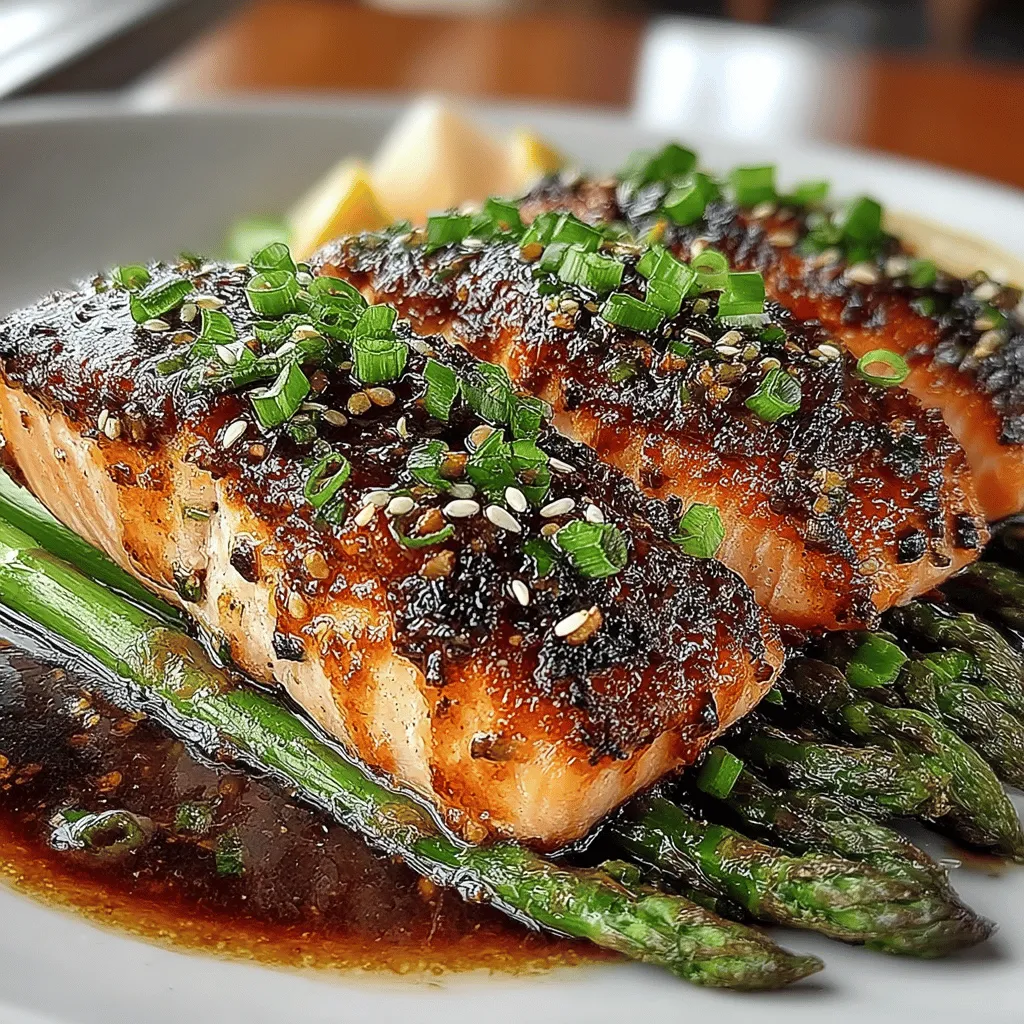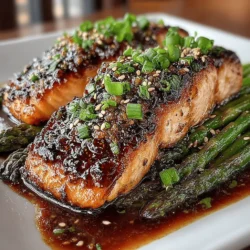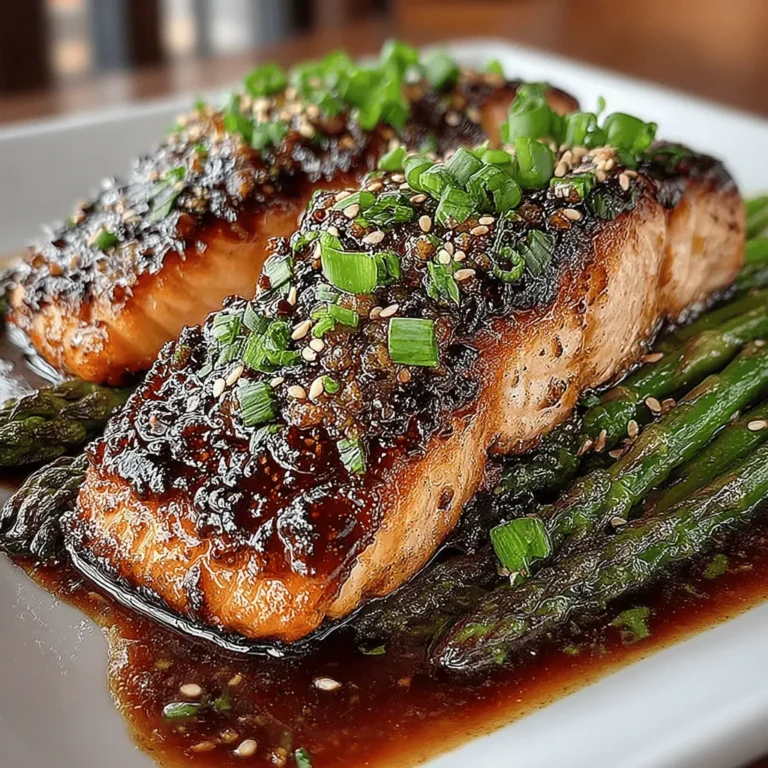Glazed Teriyaki Salmon with Roasted Asparagus: A Delicious and Nutritious Meal
In the realm of healthy dining, few dishes stand out quite like Glazed Teriyaki Salmon with Roasted Asparagus. This vibrant meal not only pleases the palate but also delivers a wealth of nutritional benefits. The star of the dish, salmon, offers a rich and savory flavor that pairs beautifully with the sweet and tangy notes of teriyaki sauce. Meanwhile, the roasted asparagus adds a delightful crunch and a burst of color, rounding out the meal with its fresh taste and numerous health benefits.
Salmon has gained immense popularity as a go-to protein option, and it’s easy to see why. This fish is not only delicious but also packed with essential nutrients, making it a favorite among health-conscious eaters. The balance of flavors in this dish creates a delightful culinary experience that is both satisfying and nourishing, appealing to those looking to indulge without compromising on health.
Understanding Teriyaki Sauce
Teriyaki sauce has its origins in Japan, where it was traditionally used as a marinade and glaze for grilled meats. The name “teriyaki” derives from the Japanese words “teri” (meaning glaze) and “yaki” (meaning grill or broil). Traditional teriyaki sauce is made by combining soy sauce, mirin (a sweet rice wine), and sugar, creating a sweet and savory glaze that enhances the natural flavors of the meat.
Over the years, teriyaki sauce has evolved and adapted to various culinary preferences, especially in Western cuisine. Today, many home cooks opt for a simpler version of the sauce, often using soy sauce, honey or maple syrup, rice vinegar, sesame oil, garlic, and ginger. These ingredients not only simplify the preparation but also allow for customization based on dietary preferences. For instance, using low-sodium soy sauce can help manage sodium intake, making the dish heart-healthier without sacrificing flavor.
Using natural sweeteners like honey or maple syrup in place of refined sugars adds depth to the sauce while also offering a more wholesome alternative. These ingredients not only enhance the taste but also provide additional health benefits, making the teriyaki sauce an integral component of this dish.
Health Benefits of Salmon and Asparagus
When it comes to nutrition, both salmon and asparagus are true powerhouses. Salmon is renowned for its high content of omega-3 fatty acids, which are essential for heart health and have been linked to reducing inflammation and improving overall brain function. A single serving of salmon is also rich in protein, providing the body with the necessary building blocks for muscle growth and repair. Additionally, salmon is packed with vitamins such as B12, D, and selenium, further supporting overall health and well-being.
Asparagus, on the other hand, is a nutrient-dense vegetable that complements salmon perfectly. It is low in calories while being high in fiber, which aids digestion and promotes a feeling of fullness. Asparagus is also rich in vitamins A, C, E, K, and folate, contributing to a well-rounded diet. The combination of these two ingredients not only makes for a delicious meal but also offers a myriad of health benefits. Together, they create a balanced dish that supports heart health, boosts the immune system, and promotes healthy skin.
Ingredients Breakdown
To create the perfect Glazed Teriyaki Salmon with Roasted Asparagus, it’s essential to choose quality ingredients. Here’s a breakdown of what you’ll need for this flavorful dish:
Salmon Fillets: Selecting fresh salmon is crucial for achieving the best flavor and texture. Look for fillets that are bright in color and have a clean, ocean-like smell. If fresh salmon isn’t available, you can opt for frozen salmon, but make sure to thaw it properly before cooking. For those who may not prefer salmon, options like trout or even chicken can work well as alternatives.
Asparagus: Choosing the right asparagus is key to a successful dish. When selecting asparagus, look for firm, vibrant green stalks with tightly closed tips. Avoid any that appear limp or have wilted tips. To prepare asparagus, simply trim the woody ends off the stalks, usually about 1-2 inches from the bottom. You can snap the stalks gently, and they will naturally break at the right point, discarding the tougher part.
Teriyaki Sauce Components:
– Soy Sauce: The base of teriyaki sauce, providing that signature umami flavor. Opt for low-sodium versions to control salt intake.
– Honey or Maple Syrup: Adds sweetness to the sauce, balancing the saltiness of the soy sauce. Choose organic varieties for a cleaner taste.
– Rice Vinegar: Provides acidity, enhancing the sauce and balancing flavors. It’s milder than other vinegars, making it ideal for this dish.
– Sesame Oil: Adds a nutty flavor that complements the other ingredients beautifully. Use toasted sesame oil for an even richer taste.
– Garlic and Ginger: These aromatics enhance the sauce with depth and complexity. Freshly minced garlic and ginger are preferable for maximum flavor.
– Cornstarch: Used as a thickening agent for the teriyaki sauce, giving it that desirable glaze-like consistency.
With these ingredients on hand, you’re well on your way to creating a delicious and healthy meal that is sure to impress.
Step-by-Step Cooking Instructions
Now that you have a good understanding of the dish and its components, it’s time to dive into the cooking process. The following steps will guide you through creating the perfect Glazed Teriyaki Salmon with Roasted Asparagus.
1. Preheat the Oven: Start by preheating your oven to 400 degrees Fahrenheit (200 degrees Celsius). This temperature is ideal for roasting asparagus while allowing the salmon to cook evenly.
2. Prepare the Asparagus: Rinse the asparagus under cold water and trim the ends as mentioned earlier. Place the asparagus on a baking sheet lined with parchment paper. Drizzle with olive oil and season with salt and pepper to taste. Toss to coat evenly and spread them out in a single layer.
3. Make the Teriyaki Sauce: In a small saucepan, combine the soy sauce, honey or maple syrup, rice vinegar, sesame oil, minced garlic, and ginger. Stir well and heat over medium heat until it begins to simmer. In a small bowl, mix a teaspoon of cornstarch with a tablespoon of water to create a slurry. Gradually add this slurry to the simmering sauce, stirring constantly until the sauce thickens. Remove from heat and set aside.
4. Prepare the Salmon: Place the salmon fillets on another baking sheet lined with parchment paper. Brush each fillet generously with the teriyaki sauce, reserving some for later.
5. Roasting: Place both the asparagus and salmon in the preheated oven. Roast the asparagus for about 10-15 minutes, or until tender and slightly crispy. The salmon will usually take about 12-15 minutes, depending on the thickness of the fillets. The fish should be opaque and flake easily with a fork when done.
In the next part of this article, we will explore the final steps to complete this delightful dish, along with serving suggestions and tips to elevate your culinary experience. Stay tuned for more delicious insights into preparing Glazed Teriyaki Salmon with Roasted Asparagus.

Preparing the Teriyaki Sauce
The teriyaki sauce is the heart of this dish, infusing the salmon with a rich, sweet, and savory flavor. To prepare the sauce, you will need:
– Soy Sauce: 1/2 cup
– Brown Sugar: 1/4 cup
– Mirin: 1/4 cup (a sweet rice wine)
– Rice Vinegar: 1 tablespoon
– Garlic: 2 cloves, minced
– Ginger: 1 tablespoon, grated
– Cornstarch: 1 tablespoon (optional, for thickening)
Mixing the Ingredients: Start by combining the soy sauce, brown sugar, mirin, rice vinegar, minced garlic, and grated ginger in a small saucepan. Heat the mixture over medium heat until the sugar dissolves completely. This will take about 2-3 minutes. If you prefer a thicker sauce, mix the cornstarch with a tablespoon of cold water to create a slurry and gradually add it to the saucepan while stirring continuously. Allow the sauce to simmer for an additional 2-3 minutes until it reaches your desired consistency. Remove from heat and let it cool before using.
Tips for Achieving the Desired Consistency: Ensure that the sauce does not boil for too long, as this can lead to an overly thick texture. If the sauce becomes too thick, you can dilute it with a small amount of water. Conversely, if you prefer a thinner sauce, simply skip the cornstarch altogether.
Marinating the Salmon
Marinating the salmon is crucial for enhancing its flavor and ensuring tenderness. After preparing the teriyaki sauce, reserve about a third of it for glazing the salmon while cooking. Place the salmon fillets in a shallow dish or a resealable plastic bag and cover them with the remaining teriyaki sauce.
Duration and Benefits of Marinating: Allow the salmon to marinate for at least 30 minutes, but for optimal flavor absorption, aim for 1 to 2 hours if time permits. Marinating not only infuses the fish with flavor but also helps to tenderize it, making each bite incredibly juicy and satisfying.
Preparing the Asparagus
Asparagus is a perfect complement to teriyaki salmon, providing a crunchy texture and vibrant color. To prepare the asparagus:
– Ingredients: 1 bunch of fresh asparagus, trimmed
– Olive Oil: 2 tablespoons
– Salt: 1 teaspoon
– Pepper: 1/2 teaspoon
– Garlic Powder: 1/2 teaspoon (optional)
Coating the Asparagus: In a large bowl, add the trimmed asparagus spears. Drizzle them with olive oil and sprinkle with salt, pepper, and garlic powder if using. Toss the asparagus until they are evenly coated.
Importance of Spacing for Roasting: When transferring the asparagus to a baking sheet, be sure to spread them out in a single layer. This spacing allows them to roast evenly, ensuring that each spear becomes tender and slightly caramelized without steaming. Overcrowding the pan can lead to soggy asparagus, which detracts from the overall texture of the dish.
Baking the Dish
Now it’s time to bake the salmon and asparagus to perfection. Preheat your oven to 400°F (200°C).
Baking Instructions: Line a baking sheet with parchment paper for easy cleanup. Place the marinated salmon fillets on one side of the sheet and arrange the asparagus on the other side. Drizzle any remaining marinade from the salmon onto the fillets for added flavor.
Optimal Baking Time and Temperature: Bake in the preheated oven for about 12-15 minutes. The salmon is done when it flakes easily with a fork and reaches an internal temperature of 145°F (63°C). The asparagus should be bright green and tender-crisp. If you prefer your asparagus a bit more charred, you can place it under the broiler for an additional 2-3 minutes after the salmon has finished cooking.
Serving Suggestions
Once your Glazed Teriyaki Salmon and Roasted Asparagus are ready, it’s time to plate and serve. Here are some creative serving suggestions to elevate your meal.
Pairing with Rice or Quinoa
Serving the teriyaki salmon with a side of rice or quinoa not only complements the dish but also enhances its nutritional profile.
– Rice: Steamed jasmine or basmati rice works wonderfully, soaking up the teriyaki sauce beautifully. For a healthier option, you can opt for brown rice, which adds fiber and a nuttier flavor.
– Quinoa: Quinoa is an excellent gluten-free alternative that provides a complete protein source, making your meal more filling. Its slightly nutty flavor pairs well with the sweet and savory notes of the teriyaki salmon.
Adding a Side Salad
To round out your meal, consider adding a fresh side salad. A simple mixed greens salad with a light vinaigrette can provide a refreshing contrast to the rich flavors of the salmon.
– Recommended Salad Options:
– Cucumber and Tomato Salad: Thinly sliced cucumbers and cherry tomatoes tossed with olive oil, lemon juice, salt, and pepper.
– Asian Slaw: Shredded cabbage, carrots, and bell peppers combined with a sesame dressing can enhance the Asian theme of your meal.
– Avocado Salad: Diced avocado with lime juice, cilantro, and a touch of salt for a creamy, zesty addition.
Wine Pairing
To elevate your dining experience, consider pairing your meal with a suitable wine.
– White Wines: A crisp Sauvignon Blanc or a light Pinot Grigio can enhance the flavors of the teriyaki glaze and refresh the palate.
– Rosé: A dry rosé can also work well, providing a fruity note that complements the sweetness of the teriyaki sauce without overpowering the dish.
Conclusion
Preparing Glazed Teriyaki Salmon with Roasted Asparagus is not only a feast for the taste buds but also a nutritious option that can be enjoyed on any occasion. The combination of the sweet and savory teriyaki sauce with perfectly roasted asparagus creates a delightful balance of flavors and textures.
With its health benefits, including high protein content and essential vitamins from the asparagus, this dish is a fantastic choice for both weeknight dinners and entertaining guests. The simplicity of the preparation process means that even novice cooks can master it with ease, making it a go-to recipe in your culinary repertoire.
We encourage you to try this recipe for a satisfying meal that will impress your family and friends. Whether you serve it on a regular weeknight or at a special gathering, Glazed Teriyaki Salmon with Roasted Asparagus is sure to become a favorite. Enjoy the delightful journey of preparing and savoring this delicious dish!

